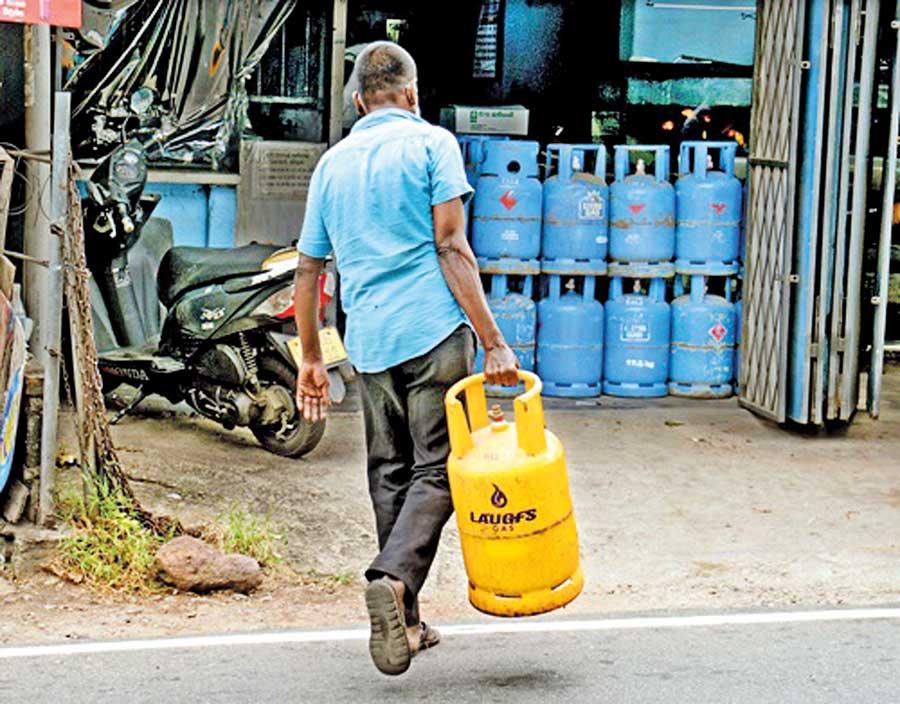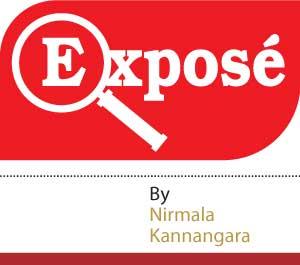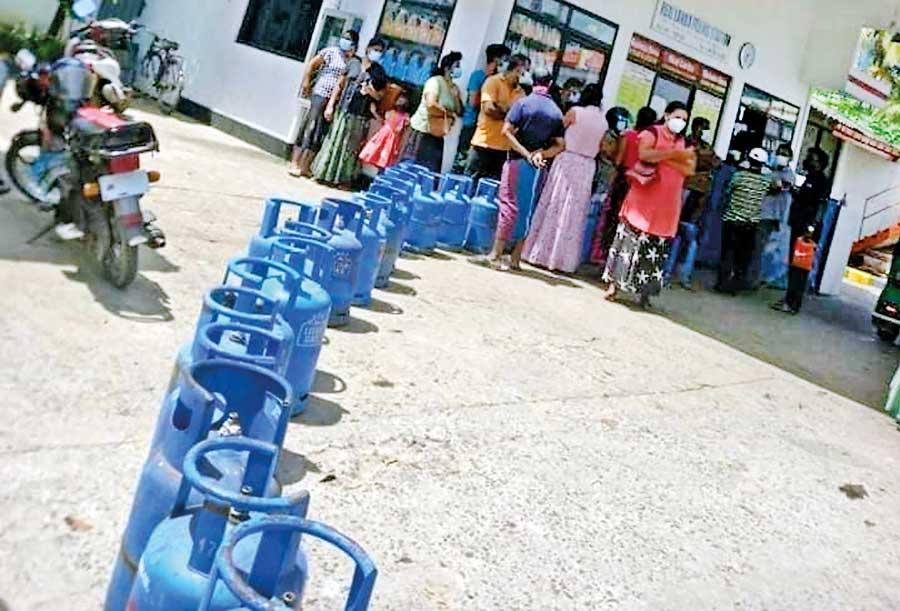Reply To:
Name - Reply Comment
Last Updated : 2024-04-25 16:11:00

If the marketer can supply a product with 30% rich Propane the present spate of explosions that are causing damages to property would come to an end
- The liquid/gas equilibrium mixture in a cylinder is a compressed liquid/gas and the Butane is easily liquefied, but not Propanes.
- The cylinder regulator may be unable to cope with the high pressure and this can be considered as the cause of recent explosions
- The Propane percentage should be less than 30 in the LPG composition to comply with the safety standard
- It is alleged that the catastrophe that has been caused so far over the past few weeks was due to this high pressure
- According to Suduwella, 1430kPa pressure is not suitable for a tropical country like Sri Lanka
- According to Suduwella Shell Gas- which is an international giant in the gas industry- has a better safety system
The failure of respective governments since 2012 to grant legal status to the Public Utilities Commission of Sri Lanka to regulate the Petroleum Industry has led to the sale of unsafe gas cylinders in the country to a great extent, it is learned.
Sri Lanka to regulate the Petroleum Industry has led to the sale of unsafe gas cylinders in the country to a great extent, it is learned.
In the backdrop of the government’s failure to find a solution to the sale of these unsafe gas cylinders, sources from the Public Utilities Commission of Sri Lanka (PUCSL) said that neither they nor any other government entity has been appropriately empowered to regulate the petroleum industry; which includes petrol, diesel, kerosene, jet fuel, furnace oils and liquefied petroleum gas (LPG).
Cyril Suduwella, Former Head of Laboratory/ Technical Service Manager and Chief Chemist, Senior Deputy General Manager of Ceylon Petroleum Corporation said that although PUCSL in 2002 was made the designated regulator for petroleum, water and electricity industries, powers were vested upon the PUCSL to regulate the electricity industry and as the shadow regulator of lubricants, but to a lesser extent regarding the other two industries.
Despite the Attorney General having approved the Legal Draftsmen’s Petroleum Product Special Provisions Act in 2012, it is yet to be tabled in parliament for approval. This is causing a delay in attributions being made regarding the spate of gas explosions and deaths reported from many parts of the country.
“Earlier, petroleum products such as LPG were subjects that came under the Ministry of Power and Energy, but for unknown reasons it was taken under the Ministry of Finance. Unless powers are vested with a regulator the standard of LPG will be changed even in future for financial benefits,” Suduwella said.
He further stressed the need that the LPG business in Sri Lanka should be regulated through a regulator adding that the only viable solution is the PUCSL.
“The electricity industry is regulated by the PUCSL and the CEB has no powers to make any changes – may it be the tariff or any other service provided by them. Likewise, if the PUCSL is given the powers to regulate the petroleum industry, it would find an independent lab to check the gas composition and take all safety measures, which the public and private gas suppliers in the country have to abide by,” he further added.
According to Suduwella, the liquid/gas equilibrium mixture in a cylinder is a compressed liquid/gas and the Butane is easily liquefied, but not Propane.
“Butane is liquefied easily, but not the Propane. Propane, having its boiling point at - 42C needs high pressure to convert into a liquid. Therefore, when more propane is introduced into an LPG mixture, very high pressure is required for the liquefaction process. This high pressure is controlled by the cylinder regulator. To control this high pressure, the regulator should be strong enough to bear the pressure and deliver under controlled pressure,” Suduwella explained.
He further said that in Sri Lanka, the ambient temperature, the safe level of Propane should be less than 30% +/- 5% of the gas composition in a cylinder and the more the Propane percentage is increased, the more the pressure in the cylinder rises. In such an event, the cylinder regulator may be unable to cope with the high pressure and this can be considered as the cause of recent explosions.
“We have our own specifications and the Propane percentage should be less than 30 in the LPG composition to comply with the safety standard. The vapour pressure shows an indication of the composition. If the vapour pressure is checked, it can reveal the gas composition; which is technically called as Azeotropic mixture which is the Propane and Butane mixture,” he added.
This newspaper is in possession of the Specification for LPG (Second Revision) issued recently for public comments by the Sri Lanka Standard Institution. According to the specification the vapour pressure at 37.8C (max.) should be 1050kPa which is the recommended standard for safety.
“Earlier, petroleum products such as LPG were subjects that came under the Ministry of Power and Energy, but for unknown reasons it was taken under the Ministry of Finance. Unless powers are vested with a regulator the standard of LPG will be changed even in future for financial benefits”
- Cyril Suduwella
Former Head of Laboratory/ Technical Service Manager and Chief Chemist, Senior
Deputy General Manager of
Ceylon Petroleum Corporation
It further states that LPG shall conform to the requirements when tested in accordance with the methods specified. It further states, ‘Each and every filled cylinder shall comply with gas tightness test as specified in SLS 1178, the cylinder shall be revalidated for the conformity of SLS 1178 once in every five years, the test date shall be marked on the collar of the cylinder and the manufacturer shall be responsible for issuing of safety instructions at each first purchase of a cylinder by a consumer’.
The specification documents further state that, ‘The LPG manufactured or filled in compliance with the standard shall be marked on the cylinder- legibly and indelibly- with the test date revalidation of the cylinder, the tare weight, the net weight, the words ‘extremely flammable’ and ‘leak test passed’, precautionary and safety advice and any other marking imposed by legislation’.
If the LPG and the filled LPG cylinder do not conform to one or more of the requirements specified in this standard, it shall be declared as not conforming to the requirements of this standard, but if it conforms to all the requirements specified, it shall be declared as conforming to the requirements of this standard.
But however, the earlier specification document (First Revision), shows that the vapour pressure at 37.8C (max.) is 1430kPa which is the pressure maintained in gas cylinders as of now. It is alleged that the catastrophe that has been caused so far over the past few weeks was due to this high pressure.
According to Suduwella, 1430kPa pressure is not suitable for a tropical country like Sri Lanka. He added that the ideal vapor pressure in the gas cylinder should be 1050kPa.
Suduwella further mentioned how the standard regulator usually contains variable devices to control pressure manually though low-cost regulators are made using a diaphragm (which is clamped between the cylinder cover and cylinder body) to control the high pressure and the regulator.
Unexpected catastrophes
“In the event the cylinder pressure is very high, either the diaphragm or any critical component of this pressure control system may get damaged-causing unexpected catastrophe,” he added.
According to him, the gas pressure forms according to the liquid in the cylinder.
“If there are more Propane than Butane, the pressure in the cylinder becomes high. Unless without the knowledge of Litro and Laugfs the suppliers wouldn’t have changed the composition. The samples taken from the port of loading and port of unloading should show the composition,” he further added.
When the properties of matter are concerned as solid, liquid and air – the air is the substance which always occupies full space of its container. This is called entropy in Chemistry- which means gas molecules will accrue maximum freedom and will occupy the entire container.
“Why can’t they reveal how many tons of this substandard gas were imported to the country and on how many occasions, how many cylinders were filled with this stock, how many cylinders were sold, how many were recalled and what happened to the remaining stock. They have to reveal this to the country as the consumers believe that these recalled unsafe cylinders are back in the market”
- Thushan Gunawardena
Former Executive Director Consumer Affairs Authority (CAA)
“This will end up occupying gas in the entire space available. This is applicable in gas leak conditions. If a small gas leak is created it will gradually release LPG and the accumulative concentration will occupy the entire space gradually. When the right air and gas composition is reached, the explosion takes place if the right temperature or spark ignition is created,” he said.
According to him, to originate a fire, three basic requirements should be in place:
1. Right concentration and fuel gas
2. Sufficient oxygen concentration
3. Ignition temperature or spark
If these three conditions are met during gas leakages an instant fire takes place as an explosion.
Suduwella further mentioned how the Sapugaskanda Oil Refinery prohibits its staffers from wearing shoes while being inside as even a tiny nail in a shoe can cause a spark and lead to a fire.
“The oil refinery takes precautions to avert any such unfortunate incidents. A simple switch or an electric breaker or electrical solenoids (a type of electromagnet) activation also can easily create electric sparks to start a fire in the mixture. However, most of the new generation electric items are intrinsically safe. Power switches or power plugs are not so safe under the above conditions. Anyone switching on a light means, generating a spark which can instantly cause inferno and create panic,” Suduwella explained.
When asked as to why the gas in present cylinders is odorless- which is why the users have failed to find out that there is a gas leak- Suduwella said that the chemical named Ethyl Mercaptan that is mixed to the gas to give the unpleasant odor may have not been added or lessened for unknown reasons.
“With regard to commercial LPG- irrespective of its constituent of Propane and Butane-it is colourless and odorless. Therefore Ethyl Mercaptan is added to make the odorless LPG to have that awful smell so as to detect the slightest leak under safe conditions,” he added.
According to Suduwella Shell Gas- which is an international giant in the gas industry- has a better safety system. “The gas they sold to the Sri Lankan market did not have more than 30% Propane in the gas mixture which was always under safe limits. If the marketer can supply 30% rich Propane the present spate of explosions that have caused damages to properties and the lives that were snatched away will come to an end. However random cases cannot be ruled out due to personal errors,” he claimed.
Meanwhile former Executive Director Consumer Affairs Authority (CAA) Thushan Gunawardena told the Daily Mirror, that it is the duty of Litro and Laugfs Gas to tell what happened to the gas they imported where its composition of Butane/ Propane has been changed to 50:50 from 80:20.
“When I was the CAA Chairman, I wrote in April to the then Chairman Litro Gas Anil Koswatte to withdraw the 18 litre cylinder from the market as its composition was not suitable for a tropical country like ours. After a big battle, they had to withdraw these cylinders from the market. If they did withdraw these gas filled cylinders what happened to them? Why can’t they reveal how many tons of this substandard gas were imported to the country and on how many occasions, how many cylinders were filled with this stock, how many cylinders were sold, how many were recalled and what happened to the remaining stock. They have to reveal this to the country as the consumers believe that these recalled unsafe cylinders are back in the market,” Gunawardena alleged.
According to Gunawardena, although he underscored the consequences the consumers would have to face because of the change of the composition it has now been confirmed that the pressure in the cylinder is affected due to the change of gas composition and this has caused the explosions.
“In April, after Litro changed the gas composition and attempted to justify what they did by maintaining that they did it so that consumers would benefit, in a letter dated April 28, 2021, Director HSE and Quality Assurance, Litro Gas Lanka Ltd; Jayantha Basnayake wrote to Director-General Corporative Service, Marketing Development and Consumer Protection, U.G. Ratnasiri that the evaporation pressure in the 12.5kg cylinder that has Butane/ Propane ratio at 80:20, is 65 psig@ 100F has an unstable flame, but in the new pack of 18L with a ratio of 50: 50 has a high evaporation pressure of 105 psig@100F and gives a fixed proper flame that benefits the consumers to use the latter cylinder for a longer period. In order to market the high cost 18L gas cylinder, Litro Gas Lanka has not only put their customers’ lives in danger, but also condemned the gas it has being supplying over the past 25 years. Soon after the new composition was introduced, I checked with those who have the expertise knowledge in this industry. According to them, increasing Propane more than 30% is extremely dangerous which has now proved true,” he added.
All attempts to contact Manager Sales and Corporate Communication Litro Gas Lanka, V. Ketheeswaran were futile as he did not answer any of the calls from the Daily Mirror. When a text message was sent to him asking as to what happened to the gas that was imported changing its composition to 50:50 after Litro Gas withdrew the cylinders from the market, Ketheeswaran sent a reply saying ‘we provided details on this regard to the media few weeks back’. Although another message was sent to him that this newspaper wished to talk to him, Manager Sales and Corporate Communication Litro Gas Lanka did not send any response until this edition of the newspaper went for publication.
Attempts made to contact Director Consumer Affairs and Information CAA, Asela Bandara to find out why they failed to direct Litro Gas Lanka to recall not only the unused gas filled cylinders, but also the used cylinders as well at the initial stage when few explosions were reported and why they were allowed to supply gas continuously too failed. Although a text message was sent to Bandara requesting for a comment, he too did not respond.

Why can’t the authorities reveal how many tons of substandard gas were imported to the country?

Add comment
Comments will be edited (grammar, spelling and slang) and authorized at the discretion of Daily Mirror online. The website also has the right not to publish selected comments.
Reply To:
Name - Reply Comment
US authorities are currently reviewing the manifest of every cargo aboard MV
On March 26, a couple arriving from Thailand was arrested with 88 live animal
According to villagers from Naula-Moragolla out of 105 families 80 can afford
Is the situation in Sri Lanka so grim that locals harbour hope that they coul